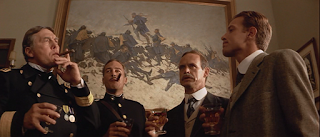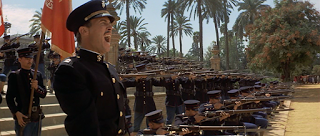
The Milius Doctrine: Steve Kanaly as Captain Jerome
In May 1975, Americans witnessed two swashbuckling spectacles affirming American military might. Both involved gallant Marines rescuing hostages from dastardly villains in exotic lands. One occurred on film. The other took place in reality.The first was the brainchild of John Milius, Hollywood's right wing enfant terrible. He penned the script for The Wind and the Lion in the late '60s, after reading Barbara Tuchman's American Heritage article on the Perdicaris Incident of 1904. After establishing a screenwriting career and directing his first feature, Dillinger (1973), Milius received MGM's backing, two major stars (Sean Connery and Candice Bergen) and a respectable budget for his imperial epic.
The second came from a harried president: Gerald Ford, nine months into his accidental presidency. He forfeited public goodwill by pardoning Richard Nixon; he inherited from Nixon a fractured electorate, declining economy and anti-government cynicism. Ford also inherited an enfeebled foreign policy: the Paris Peace Accords left Vietnam in uneasy stalemate, détente pushed America towards accommodation with the USSR and China, the War Powers Act strengthened Congressional controls on military action. Then came Saigon.
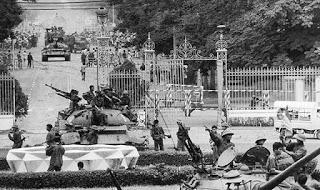
Fall of Saigon, April 1975
After two years of ceasefire, North Vietnam invaded South Vietnam, overrunning poorly-led ARVN troops. As the Communists approached Saigon, Ford begged Congress to give South Vietnam financial, if not military aid: they refused. On April 30th, North Vietnamese troops entered the South Vietnamese capitol, accompanied by humiliating scenes of American troops and diplomats fleeing the city.Eleven years of American intervention - 58,000 American and millions of Vietnamese lives - and Indochina was now Communist. Americans argued over its implications, whether it was a humiliating defeat or an overdue climax. No one questioned that Communists ruled Vietnam, Laos and Cambodia. Or that American prestige and self-esteem suffered a crippling blow.
Now came time to restore America's image. "The United States must carry out some act somewhere in the world which shows its determination to continue to be a world power," Secretary of State Henry Kissinger told Ford. Soon Cambodia provided a convenient excuse - and an historical echo.
From Farce to Epic
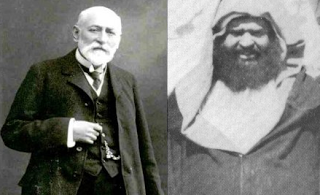
Ion Perdicaris (left) and Mulai el-Raisuli
The real Perdicaris Incident was more farce than epic. Mulai el-Raisuli, a Berber chieftain in Morocco, kidnapped American expatriate Ion Perdicaris and his English stepson, Cromwell Varley, in May 1904. Raisuli had spent years antagonizing Morocco's Sultan Abdelaziz, who precariously maintained the country's independence amidst European meddling. Raisuli demanded a $70,000 ransom and control of Tangiers for their return.President Theodore Roosevelt spied an opportunity. Like Ford an accidental president, Roosevelt was running for reelection against Democrat Alton Parker. Though acclaimed as "the most popular President since Washington," Roosevelt felt the burn of illegitimacy. Renowned as the imperialist who'd cajoled William McKinley into the Spanish-American War, then led the Rough Riders up San Juan Hill, what better way to cement his credibility?
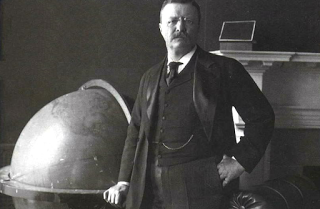
Theodore Roosevelt
Roosevelt sent the Atlantic Squadron with two Marine companies to Tangiers. "Our position must be to demand the death of those who harm him," Roosevelt proclaimed. But it was empty bluster. With Raisuli ensconced in the Rif Mountains, what could warships achieve? The Moroccan government was intransigent; Britain and France refused to countenance invasion. The situation threatened to become a fiasco.Then Roosevelt's Secretary of State, John Hay, conjured an ingenious solution. With help of Britain's Minister to Morocco, Sir Arthur Nicholson, he convinced the Sultan to accept Raisuli's demands. Then Hay cabled American consul Samuel Gummere, proclaiming "This government wants Perdicaris alive or Raisuli dead." Humiliation became triumph.
It was a masterpiece of spin. Republican delegates cheered Hay's cable at the Republican National Convention, spurring Roosevelt to a landslide reelection. No one cared that America had capitulated to Raisuli, or that Perdicaris had never been in danger. It probably wouldn't have mattered if they'd known that Perdicaris renounced his American citizenship decades before. Roosevelt affirmed his manhood and American prestige, through tough rhetoric and forceful gestures.
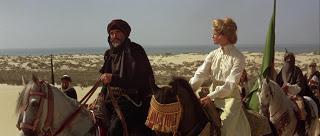
Sean Connery as Raisuli and Candice Bergen as Eden
To present this incident heroically requires considerable invention. In Milius's hands, Raisuli, a murderous feudal bandit, becomes a dashing freedom fighter played by Sean Connery. Ion Perdicaris, middle-aged expatriate, becomes Candice Bergen's beautiful, tough Eden Perdicaris, with two pint-sized kids. The two engage in barbed banter and tentative romance as American Marines and German soldiers close in.Milius invents a massive three-way battle between American, Berber and German troops. In reality, Roosevelt's intervention averted conflict. In 1906, he organized the Algeciras Conference to broker French and German claims on Morocco. The conference promised Morocco's independence but negotiated European spheres of influence within the country. In 1912, France proclaimed Morocco a protectorate; Spain received western Morocco.
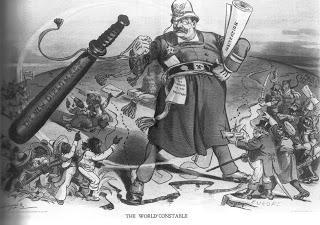
Roosevelt as World Policeman
As for Raisuli, he became Pasha of Tangier after Perdicaris's return. The Sultan sacked him three years later for corruption and cruelty; Raisuli eagerly joined Mulai Hafed's coup against him in 1908. He again became an outlaw when Spain annexed the Rif. He taunted Spanish General Manuel Silvestre with a florid peroration paraphrased by Milius:You and I form the tempest. You are the furious wind; I am the calm sea... But between us, there is a difference. I, like the sea, never leave my place; while you, like the wind, are never in yours.
Raisuli resisted Silvestre's troops for a decade. But when Abd-el Krim launched the Rif War in 1921, Raisuli switched sides. Biographer Rosita Forbes wrote he was animated by "lust for blood and lust for gold" rather than Berber freedom. Krim defeated Raisuli in January 1925 and imprisoned him; confined to a cage, Raisuli soon died of dropsy. So much for the "Last of the Barbary Pirates."
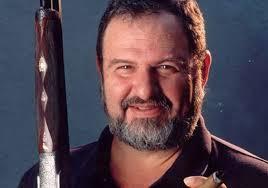
John Milius
Milius felt little compunction about following history. He approached it "as a David Lean film... two guys, Teddy Roosevelt and the Raisuli, yelling at each other across oceans." He's less interested than presenting historical facts than an exciting adventure. Though one whose subject had uncanny real world resonance.Ford and Kissinger: Potentially Trigger Happy
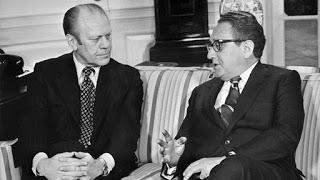
Gerald Ford (left) and Henry Kissinger
Cambodia fell to Pol Pot's Khmer Rouge on April 17th, 1975. Lan Nol's unpopular, American-backed regime gave way to a monstrous dictatorship. Pol Pot depopulated Cambodia's cities, forcing Cambodians into reeducation camps and collective farms. Up to two million Cambodians died during the Khmer Rouge's four year rule, nearly a third of their population.Amidst the chaos, an American merchant vessel, the Mayaguez, drifted into Cambodian territorial waters. Khmer sailors seized the vessel on May 12th and interned its 39 man crew. The Khmers had been indiscriminately seizing foreign vessels in the weeks after capturing Phnom Penh; Korean, Panamanian and Thai ships were attacked prior to the Mayaguez. It was a hostile action but not necessarily a cause for war;
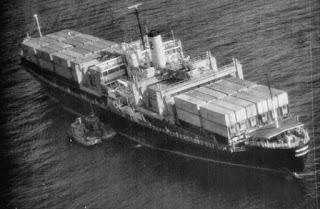
The Mayaguez
Needing a victory, Ford inflated the incident into a crisis. "Rhetoric alone... would not persuade anyone that America would stand firm," Ford wrote. "They would have to see proof our resolve." Besides Vietnam, memories of North Korea's 1968 seizure of the USS Pueblo, and Lyndon Johnson's humiliating nonresponse, resurfaced. Ford seized upon the incident as an opportunity to flex America's muscle.Henry Kissinger's prestige was on the line, too. Lauded by the press for his diplomatic initiatives, Kissinger was despised by conservative Republicans who equated détente with appeasement. (They ignored Kissinger's role in escalating the Vietnam War or destabilizing leftist regimes in Angola, Chile and elsewhere.) Kissinger felt that "People should have the impression that we are potentially trigger-happy."
Other Republicans agreed. Vice President Nelson Rockefeller spurned diplomacy: "I think a violent response is in order." Bob Hartmann, a presidential aide, commented that "We should not just think of what is the right thing to do, but what the public perceives." When Thailand refused use of its airbases, Ford admitted that "I didn't give a damn about offending their sensibilities" and authorized their use anyway.
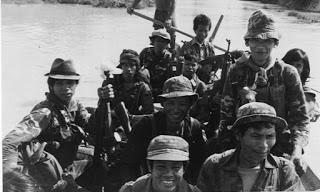
Khmer Rouge forces
Ford went through the motions of diplomacy: He asked the UN for help, tried mediating with Cambodia through China, appraised Congress of possible military action. But Ford made little effort to hide that military action was in the offing. He dispatched two Marine battalions to Thailand, along with warplanes and gunships, preparing to strike the Khmer Rouge.Kissinger capped off the tough talk, urging Ford to not only rescue the hostages, but bomb the Cambodian mainland. "Let's look ferocious!" he insisted. So encouraged, on May 15th Ford unleashed the Marines on Koh Tang Island, where 100 Khmer soldiers held the Mayaguez. This despite learning that the crew had been relocated to Rong Sam Lem.
Theodore Roosevelt and the Spirit of America
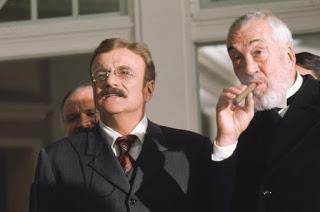
Brian Keith as Theodore Roosevelt, John Huston as John Hay
Theodore Roosevelt overcame childhood sickliness and his wife's early death to become America's leading polymath: cowboy and scientist, lawman and lawmaker, soldier and diplomat, wealthy trustbuster, hunter and conservationist. Roosevelt preached "the strenuous life,"&claiming that the "highest form of success which comes, not to the man who desires mere easy peace, but to the man who does not shrink from danger, from hardship, or from bitter toil."Naturally TR was a hero to John Milius, who portrayed him both in The Wind and the Lion and Rough Riders (1997). "He was... the first American hero that I ever heard about," the director recalled: both overcame asthma to become sportsmen (Milius, surfing and rifle shooting; Roosevelt, you name it). As embodied by Brian Keith, Roosevelt becomes both an epochal tough guy and thoughtful statesman, mixing patriotic bromides with near-childish bloodlust.
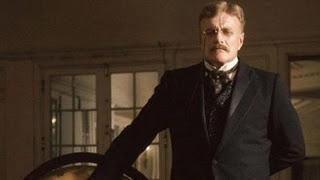
Embodying American power
Roosevelt's introduced posing for a photograph, his hand on a globe as Hay reads a telegram about Perdicaris's kidnapping. He projects American power in other ways, whether cutting through Panama on his birthday cake, fretting over an ill-fitting rifle and impersonating a grizzly bear, which he claims embodies "the spirit of America."Milius emphasizes Roosevelt's sportsmanship: he boxes and shoots arrows while discussing foreign policy with John Hay, target shoots with his children, hunting bears. His masculinity's especially tied to his choice of weapons: "What kind of rifle does he use?" Raisuli asks Eden. President and bandit's affinity for firearms cements their bond: at film's end they exchange friendly telegrams, recognizing each other as cut from the same cloth.
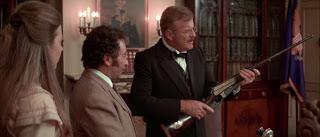
The best shot that's ever occupied the White House
In one scene, Roosevelt goes hunting in Yellowstone National Park. The film's most famous speech shows Roosevelt musing over a freshly killed bear, explaining to reporters why he admires the animal:The American grizzly bear is a symbol of the American character. Strength, intelligence, ferocity. A little blind and reckless at times, but courageous beyond all doubt. And one other trait... Loneliness. The bear lives out his life alone. Indomitable, unconquered, but only alone. He has no real allies, only enemies, but none of them are as great as he.
He defines loneliness as essential to America's identity. "The world will never love us," the President says. "They'll respect us, they may even grow to fear us. But they'll never love us, for we have too much audacity! And we're a bit blind and reckless at times, too." America follows its own course, regardless of what other countries think.
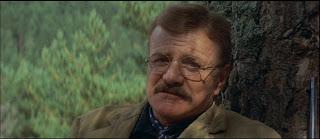
Of grizzly bears and things
Thoughtful though he is, Milius's Roosevelt relishes the prospect of confrontation. He tells Hay that a war with France and Germany "would be entertaining" and ignores his aide's caution over military deployments. In the end everything works out: the American military wins (and wins an ally in Raisuli), beating Morocco and Europe into submission. Roosevelt pasts the ultimate test of manhood.Threats, Entreaties and Military Intervention
Roy Jenson, Steve Kanaly, Geoffrey Lewis and Darrell Fetty
Early in the movie, the Raisuli taunts Eden about American hubris. "At present, you are full of power," he says, "but you're spilling it wastefully. And Islam is lapping up the drops as they spill from your bucket." Whether oil-hoarding Arabs or intransigent Communists, Americans in 1975 had many enemies to choose from. According to Milius, diplomacy is a feeble joke: détente is a wimp's substitute for warfare.Samuel Gummere, the American consul, tries negotiating with the Bashaw of Tangier, surrounded by European advisers and smoking a hookah. The Bashaw demands they speak with his nephew, the Sultan; Gummere sends his hot-tempered aide, Dreighton, who's bemused by the Sultan's decadent court. Riding on his servant-drawn carriage, the Sultan reveals that Raisuli and the Bashaw are brothers, refusing to act on the grounds that "it is difficult to be Sultan!"
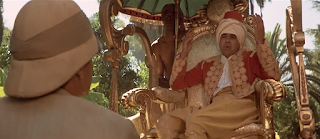
Marc Zuber as Sultan Abdelaziz
Clearly, negotiating with terrorists and Third World dictators achieves nothing. Neither Dreighton's threats nor Gummere's entreaties makes an impact. Captain Jerome, the Marine commander, offers a simpler suggestion: "Military intervention!"Like Ford's advisors, Milius's heroes treat violence as a game. Hay warns Roosevelt that sending the fleet to Tangier is illegal. Roosevelt asks: "Why spoil the beauty of the thing with legality?" Later, Gummere cautions Admiral Chadwick that military action might antagonize European powers. "Damn the legations!" the Admiral thunders. In the same scene, Captain Jerome proposes a toast: "Gentlemen, if we fail and are killed, I certainly hope that the world does go to war!"
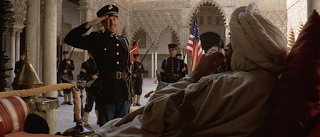
Jerome confronts the Bashaw
With Gummere's reluctant blessing, Captain Jerome's Marines invade Tangier. They march through town, past terrified Arabs and offended Europeans. (Gummere clutches a revolver, worrying that "the French and Germans [aren't] going to like this!") Jerome's Marines efficiently slaughter the Bashaw's bodyguards and take him prisoner. This results in a priceless exchange between decadent despot and headstrong American:Bashaw: You are a very dangerous man, Captain, and your President Roosevelt is mad.Jerome: (saluting) Yes, sir!
Milius caps this scene with the Marines triumphantly raising the American flag, Semper Fidelis blaring on the soundtrack. Back in Washington, Hay rages against Roosevelt's recklessness, to no avail. As the President shoots targets of Tsar Nicholas and Kaiser Wilhelm, Hay echoes the Bashaw, denouncing Roosevelt's "Utter madness!" Roosevelt simply assures Hay that "I'd never shoot anyone accidentally - I need their votes!"
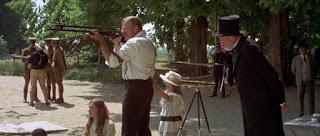
TR aims at America's enemies
Incongruously, Milius rigs the plot so that Raisuli and the Americans become allies. The Germans capture Raisuli at a hostage exchange; Eden persuades Jerome at gunpoint to rescue him. A shootout develops, the Americans doomed until Raisuli's Berbers ride to the rescue. American righteousness and Muslim machismo unite to quash European imperialists. It's a happy ending, and why worry whether it triggered World War I a decade early?It's Good to Win One for a Change
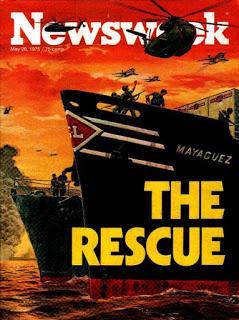
Mythmaking: Newsweek on the Mayaguez
Unlike Captain Jerome's fictional Leathernecks, the Americans attacking Koh Tang Island encountered troubles from the start. A rescue helicopter crashed on May 12th, killing 23 servicemen. Navy gunships strafed the Mayaguez the next day, killing Cambodians but also wounding several hostages. Nonetheless, preliminary bombing scared the Cambodians to arrange for the hostage's release.On May 15th, 220 Marines landed on Koh Tang and faced stiff resistance. The Khmer garrison downed three helicopters and inflicted heavy casualties; only airstrikes and the Marines' trademark tenacity prevented a disaster. A boarding party attacked the Mayaguez, only to find the Cambodians had abandoned it. After the Americans withdrew, three Marines were left behind; the Khmer executed them. Forty-one Americans died in total.
Later, the Marines found the Mayaguez crew adrift on a fishing boat. The Cambodians released them shortly before the invasion, frazzled but unharmed. The Marines' gallantry was unquestioned, but the landing was both unnecessary and badly botched. "Confused and divided lines of command and tactical mismanagement from Washington were very much in evidence," concluded a military report. As with the Perdicaris Incident, it would take significant spin to make it a victory.
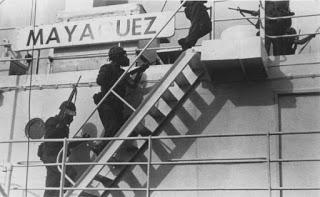
Marines board the Mayaguez
Spin they did. American leaders celebrated with macho talk more befitting a football game than military action. Newsweek and Time gave Ford laudatory cover stories, emphasizing his toughness and resolution. Senator Barry Goldwater proclaimed "It shows we've still got balls in this country!" Congressman Carrol Hubbard agreed: "It's good to win one for a change." Ford agreed: "It convinces some of our adversaries we were not a paper tiger."Ford's approval rating jumped eleven points; Americans reveled in their easy victory. No one questioned whether the mission, and the attendant loss of lives, were necessary, or what happened to the three missing Marines. Or that the Khmer regime continued its genocide unabated, until Vietnam's 1979 invasion of Cambodia. America's need for a victory outweighed the truth.
Coda: Something To Go Out On
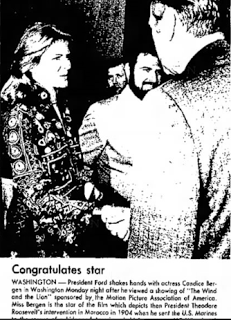
Mrs. Perdicaris meets the President
President Ford attended The Wind and the Lion's Washington premiere on May 19th, just four days after the Mayaguez rescue. He adored the film, laughing uproariously at Roosevelt's aphorisms and savoring the action scenes. Ford gushed over the Yellowstone scenes, which reminded Ford of his teenaged years working there. Milius didn't tell the President that he filmed those scenes in Spain.The connection between real and reel life wasn't lost on anyone. Andrew Sarris wondered if "political news constitute(s) one long press release for Hollywood movies." So did William Safire, Nixon speechwriter-turned-New York Times columnist. Real-life Marines were certainly impressed: for several years, Annapolis screened Captain Jerome's march through Tangier to advanced infantry courses.
Despite critical and presidential praise, The Wind and the Lion only achieved marginal box office success. Audiences preferred The Return of the Pink Panther, Peter Sellers' third Clouseau comedy, and Steven Spielberg's Jaws, which opened a month later. They chose laughs and escapist terror over rousing imperial allegories.
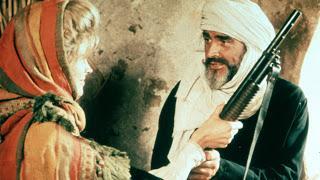
Peace through superior firepower
As Wind disappointed the studio, the Mayaguez receded into a footnote. Ford was soon overcome by inflation, OPEC and right-wing dissent; Ronald Reagan nearly bested him the 1976 primaries; Jimmy Carter finished him in November, only to crumble before Iranian hostage takers. Ford and Milius couldn't make their fantasies stick; it took Reagan, a living intersection of film and politics, to achieve that.Milius achieved his apotheosis in the Reagan era with Conan the Barbarian (1982) and Red Dawn (1984). Reagan, amidst anti-Soviet saber rattling and massive military build-up, followed the Roosevelt-Ford script in 1983: he invaded Grenada to avenge humiliation in Lebanon, repeating Ford's "hostage rescue" excuse and tactical blundering. "Our military forces are back on their feet and standing tall," he proclaimed, another President spinning near-disaster into a glorious triumph.
Meanwhile, Milius crafted Red Dawn, a fantasy of American teenagers resisting Soviet invaders. Never mind that the Soviets couldn't manage their economy or defeat insurgents in Afghanistan: onscreen, they overran Europe and conquered the United States. The Cold War contradiction: America as infinitely righteous, all-powerful, yet unceasingly vulnerable. Apply force as necessary.
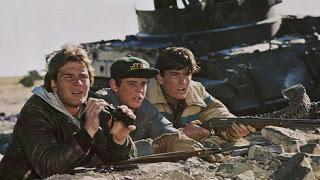
Red Dawn
The Cold War's conclusion only increased American swagger. Consider Norman Schwarzkopf's comments on Iraq's Republican Guard: "I believe that forgiving them is God's function. Our job is to arrange the meeting." Or Karl Rove, pressing for military action in Iran: "Anyone can go to Baghdad. Real men go to Tehran." Or Ted Cruz, promising to carpet bomb ISIS into oblivion.So long as American officials treat war as political capital or macho gamesmanship, The Wind and the Lion remains relevant. The Milius Doctrine: shoot first and don't ask questions. Why spoil the beauty of the thing with legality?
Sources and Recommended Reading
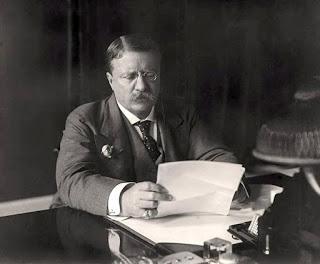 For the Perdicaris incident, see: Walter Harris, Morocco That Was (1921; online here); Edmund Morris, Theodore Rex (2001); Barbara Tuchman, "Perdicaris Alive or Raisuli Dead!" (American Heritage, August 1959; online here); and David S. Woolman, Rebels in the Rif (1968).
For the Perdicaris incident, see: Walter Harris, Morocco That Was (1921; online here); Edmund Morris, Theodore Rex (2001); Barbara Tuchman, "Perdicaris Alive or Raisuli Dead!" (American Heritage, August 1959; online here); and David S. Woolman, Rebels in the Rif (1968).For the Mayaguez incident, Ralph Wetterhahn's The Last Battle (2001) was invaluable. The Koh Tang/Mayaguez Veterans Organization has an excellent website here.
For commentary on The Wind and the Lion, see linked articles above, along with John Gallagher's interview with John Milius in Film Directors on Directing (1989) and Milius's May 2003 IGN interview (here). Milius's DVD commentary also provides useful background.
